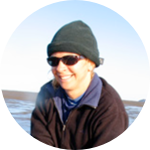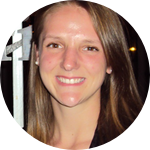Project Results
The results of this study suggest that incorporating short writing lessons (<15 minutes/week) into university-level science curriculum in an explicit and scaffolded manner can effectively improve student writing skills.
The intervention was found to be most effective for students earlier in the academic program, and the explicit teaching style proved to benefit students with lower GPAs.
For degree programs to better prepare students for their future careers, I urge them to incorporate interventions like this one early in a degree program and throughout multiple courses.About This Project
Science professors generally don't have the time or expertise to teach cross-cutting skills like communication. So, students graduate equipped with scientific knowledge but not the communication skills they need to benefit from that knowledge.
I hypothesize that we can train students to be significantly better communicators by incorporating short communication lessons into their science classes. The intervention will be assessed by blind reviews of student writing.
Ask the Scientists
Join The DiscussionWhat is the context of this research?
According to a recent nationwide survey performed on behalf of the Association of American Colleges and Universities, employers care the most about an applicant’s communication skills when hiring recent graduates. But, 75% of employers do not think recent graduates can communicate effectively. This shortcoming stems from degree programs that stay within the lanes of their academic discipline, without teaching cross-cutting skills like communication.
Employers agree that there is a need for students to learn communication skills while they are earning their university degrees. Students that receive communication training will be better at promoting themselves and their scientific field when they begin their careers.
What is the significance of this project?
Most science programs don't offer communication training. Professors don't have the time or expertise to provide instruction beyond what is specific to their scientific discipline. Students are left without knowing how to communicate their hard-earned knowledge and ideas.
Is it possible to break down those barriers? I created a one-of-a kind lesson plan that I hope can be easily incorporated into any science curriculum. It only takes 10 minutes per week in class to implement, and the teacher does not need to be a communication expert. Everything is provided in the curriculum packet.
This project also comes at a perfect time. Scientific communities across the nation are actively working to incorporate more science communication into their instruction.
What are the goals of the project?
I hypothesize that we can teach science students to be better communicators without requiring too much time or expertise from the instructor by incorporating short communication lessons into established science classes.
I've created the lesson plan, incorporated it into a science course, and collected student essays written before and after the course by students who did and did not go through the intervention. Now, with your support, I will recruit professionals from a variety of STEM fields to perform a blind review of the essays. The reviewers will rate the students' skills in a variety of topics, like use of evidence and audience consideration.
After the evaluation, the curriculum will be edited based on evaluation results, packaged for broader use, and published online.
Budget
Original Goal: $1830
The effectiveness of this lesson plan will be measured with a blind review. Reviewers from a variety of career fields will assess student writing skills by comparing essays that students write before and after taking the course. To control for outside factors that may affect student writing, we also collected essays from students who didn't go through the intervention. Reviewers will offer their time and effort to help this project succeed. In return, they will receive $10 per review they complete.
Artistic Collaboration: $400
I will pay a professional graphic artist to make an aesthetically-pleasing curriculum packet for the students as well as a promotional video and infographic for teachers.
Multi-Cultural Collaboration: $500
I am now collaborating with another researcher to identify how this curriculum could be improved for multi-cultural use, specifically in India. Funds will be put toward developing multi-cultural materials.
Endorsed by
 Project Timeline
Project Timeline
We have already accomplished a lot! I have developed the project, designed the lesson plan, and incorporated it into a science classroom at the University of Washington in Fall 2018.
Now, I just have to figure out if the project was a success. After I know which parts of the intervention were successful and receive constructive criticism from the reviewers and instructors, I will revise the lesson plan and package it so that we can share it far and wide!
Feb 13, 2019
Project Launched
Mar 01, 2019
Conduct blind review of writing samples.
Apr 01, 2019
Evaluate intervention success by statistical analysis of reviews.
Sep 30, 2019
Publish article in peer-reviewed journal and post lesson plan online open-access.
Meet the Team
Robin McLachlan
Hi! My name is Robin McLachlan, and I am a PhD student in Oceanography at the University of Washington.
Growing up in the Carolina Coastal Plain, I learned to play in the mud, smell the salty air, and appreciate my local landscape. As an undergraduate student majoring in geology, I learned to look at the landscape and sedimentary record as if they were picture books - historical archives of the geologic past that I could read to inform my community's future. Now, as a graduate student, I have received state-of-the-art education from experts in the field of coastal geology. I research the intricate relationships between coastal landscapes, natural process, and human interference.
But, like most other students, I didn't receive formal training in any cross-cutting skills, like communication, from my science department. "What do you do?" became a dreaded question. How could I even begin to wrap the intricacies and wonder of my science into casual conversation. How could I convey the importance of it to my political leaders? How could I communicate my new ideas with my colleagues, or even my boss?
Luckily for me, graduate students are a motivated bunch. Other graduate students at my university already had the same concerns, taught themselves how to be good communicators, and then began a program to teach others. I went through the program, called Engage, and then rose in the ranks to eventually sit on the Board of Directors and serve as program manager. Learning how to articulate my passion for science further fueled that passion. So many types of doors opened for me through my new ability to explain, frame, and network.
Now, I want to share these skills with undergraduate students. They are the ones who are just about to start their careers. Being able to promote their science, their own skills, and their own ideas will surely help pave their way.
Additional Information
Do you want help incorporating this Science Writing Intervention in your own classroom? Let's set up a one-on-one consultation to get you started!
Contribute $50:
30-min consultation to chat about how you can tailor this curriculum to best fit your students, your science curriculum, and your goals.
Contribute $75:
45-min consultation to
chat about how you can tailor this curriculum to best fit your students, your science curriculum, and your goals. I will also review your present homework prompts and help you revise them to better incorporate science-writing practice and progress.
Contribute $100:
1-hour consultation and I will personally review your syllabus, course content, and homework prompts and
help you revise them to better incorporate science-writing practice and progress.
Project Backers
- 33Backers
- 104%Funded
- $2,168Total Donations
- $65.70Average Donation


